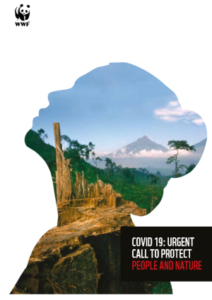Food and health are directly linked. We know that certain food is good for our health. But when it comes to how our food is being produced, do we ever stop to wonder whether our food systems are actually healthy? © Tanja Ploetz/ WWF-Germany
People and nature are interlinked
In its recent publication “Covid-19: Urgent Call to Protect People and Nature”, WWF relates this new pandemic threat to humanity’s broken relationship with nature. This mismatch comes at a high cost: Covid-19 has been threatening lives, jobs and livelihoods of people and communities around the world. With people encroaching upon the natural world, contact between humans, livestock and wildlife has also increased. As a result, the frequency and number of new zoonotic diseases, originating in animals and transmitted to people, has risen drastically over the last century (every year, around three to four new zoonotic diseases are emerging). The serious consequences for our health, economies and ecosystems have recently become obvious.
Unsustainable food systems as drivers
The WWF publication reconfirms how people and nature are interlinked and how our negative impact on the natural world increases the risk of future pandemics. Driven by unsustainable food systems, large-scale land conversion for agriculture is destroying and fragmenting forests and other natural habitats around the world, while it is increasing interactions between wildlife, lifestock and humans. This problem is only set to worsen as the challenge of feeding a growing population increases and diets shift.

© WWF
“The key drivers for the emergence of zoonotic diseases are land-use change, expansion and the intensification of agriculture and animal production, and the consumption of high-risk wildlife.”
You can download WWF’s publication “Covid-19: Urgent Call to Protect People and Nature” here.
Resilient food systems are the answer
The Covid-19 crisis has shown the urgent need for systemic change in agriculture and food production. Our project on sustainable consumption and production (SCP) has been addressing the challenges of unsustainable food production and attempting to induce a shift towards sustainability in our food systems. This included actions against deforestation and land conversion, trigering private business commitments to sustainability, as well as getting consumers to understand their responsibilities and their role in influencing value chains. By addressing both, the consumption and production of food, our project has been exploring ways out of the dilema and show-casing more sustainable approaches – making food systems more resilient and paving the way to a resilient food future.
More information on this project’s approach can be found here. For information on WWF’s approach on SCP follow this link.

